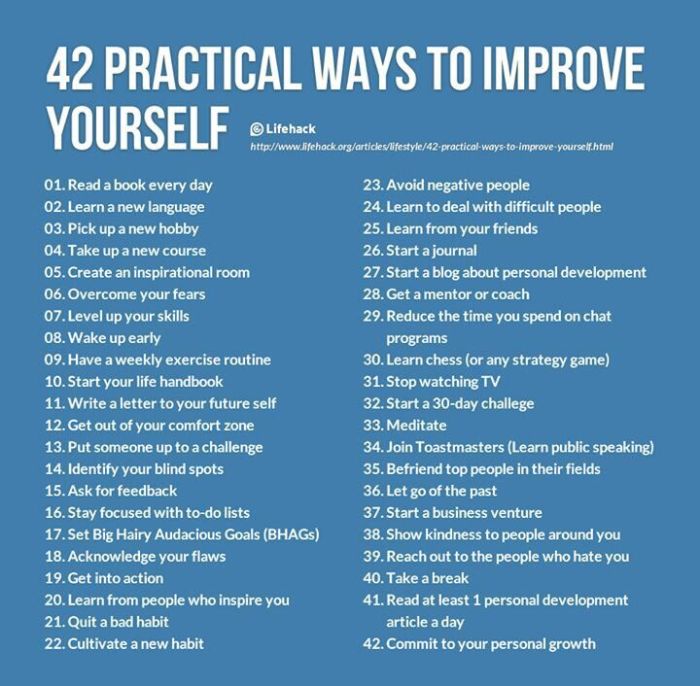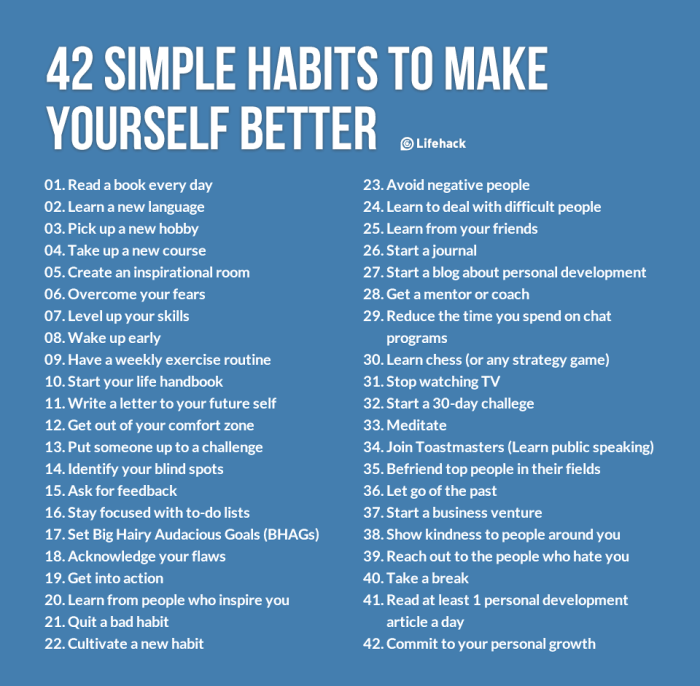Self-Improvement Tips take center stage in this guide, offering a fresh perspective on personal growth that’s as cool as your favorite high school flick. Get ready for a journey filled with practical advice and inspiring insights!
In a world where self-improvement is key to success, these tips will help you level up your game and crush your goals like a boss.
Introduction to Self-Improvement Tips
Self-improvement is the conscious effort to enhance one’s own skills, habits, mindset, and overall well-being. It plays a crucial role in personal growth by empowering individuals to reach their full potential and lead a more fulfilling life.
Areas of Self-Improvement
Self-improvement can be beneficial in various aspects of life, including:
- Personal Development: Enhancing self-awareness, confidence, and emotional intelligence.
- Career Growth: Acquiring new skills, improving time management, and setting career goals.
- Health and Wellness: Adopting a healthy lifestyle, practicing self-care, and managing stress effectively.
- Relationships: Building stronger connections, improving communication, and resolving conflicts positively.
Continuous Journey of Self-Improvement
Self-improvement is not a destination but a continuous journey. It requires ongoing dedication, self-reflection, and the willingness to step out of comfort zones. Embracing growth mindset and learning from setbacks are key elements in this journey towards personal development.
Setting SMART Goals

Setting SMART goals is a crucial aspect of self-improvement. The acronym SMART stands for Specific, Measurable, Achievable, Relevant, and Time-bound. This approach ensures that goals are well-defined and attainable, leading to more effective progress and growth.
Enhancing Self-Improvement Efforts
- Specific: Setting specific goals helps in providing clarity and focus. For example, instead of saying “I want to exercise more,” a specific goal would be “I will go for a 30-minute run three times a week.”
- Measurable: Measuring progress is essential for staying motivated. Having measurable goals allows you to track your advancement and celebrate small wins along the way.
- Achievable: Goals should be challenging yet attainable. Setting achievable goals prevents frustration and maintains momentum in your self-improvement journey.
- Relevant: Ensure that your goals align with your values and long-term objectives. Relevance keeps you engaged and committed to the process.
- Time-bound: Setting deadlines creates a sense of urgency and accountability. Having a timeframe for your goals helps in prioritizing tasks and staying on track.
Importance of Realistic Goal-Setting
Realistic goal-setting is crucial for sustainable progress in self-improvement. When goals are unrealistic, it can lead to discouragement and demotivation. By setting achievable targets, you build confidence and maintain a positive mindset throughout your journey. Remember, progress takes time, and it’s essential to set goals that push you forward without overwhelming you.
Time Management Techniques: Self-Improvement Tips
Effective time management is crucial for balancing personal growth activities and achieving self-improvement goals. Prioritization plays a significant role in managing your time efficiently and focusing on what truly matters. Overcoming procrastination and maintaining consistency in self-improvement routines are key challenges that can be addressed with the right strategies.
Impact of Prioritization in Time Management
Prioritizing tasks based on their importance and urgency can help you allocate your time effectively. By identifying high-priority activities that align with your self-improvement objectives, you can ensure that you are making progress towards your goals. Remember, not all tasks are created equal, so it’s essential to focus on what will bring you closer to self-improvement.
- Use the Eisenhower Matrix to categorize tasks into four quadrants: urgent and important, important but not urgent, urgent but not important, and neither urgent nor important.
- Focus on completing tasks in the urgent and important quadrant first to avoid last-minute stress and ensure progress towards your goals.
- Avoid getting caught up in tasks that are neither urgent nor important, as they can consume valuable time that could be better spent on self-improvement activities.
Overcoming Procrastination and Staying Consistent, Self-Improvement Tips
Procrastination can be a major roadblock to self-improvement, preventing you from taking action and making progress. By implementing strategies to overcome procrastination and stay consistent with your self-improvement routines, you can develop positive habits and achieve your goals.
- Break down tasks into smaller, manageable steps to avoid feeling overwhelmed and increase motivation to get started.
- Set specific, achievable goals with deadlines to create a sense of urgency and hold yourself accountable.
- Eliminate distractions and create a conducive environment for productivity to help you stay focused and on track.
- Establish a routine or schedule for self-improvement activities to develop consistency and make progress towards your goals every day.
Mindfulness and Self-Reflection
Mindfulness and self-reflection play crucial roles in the journey of self-improvement. By being mindful, individuals can increase their awareness of thoughts, emotions, and behaviors, leading to better decision-making and personal growth. Self-reflection, on the other hand, involves looking inward to understand one’s actions, motivations, and values, allowing for continuous learning and development.
Cultivating Mindfulness
Practicing mindfulness can be achieved through various techniques such as meditation, deep breathing exercises, and focusing on the present moment. By incorporating mindfulness practices into daily routines, individuals can reduce stress, improve concentration, and enhance overall well-being.
Techniques for Self-Reflection
- Journaling: Writing down thoughts, experiences, and feelings can aid in self-reflection and provide insights into personal growth areas.
- Seeking feedback: Asking for feedback from others can offer different perspectives and help individuals identify blind spots in their behavior.
- Mindful questioning: Engaging in reflective questions such as “What did I learn from this experience?” or “How can I improve next time?” can promote self-awareness and growth.
Benefits of Mindfulness and Self-Reflection
- Enhanced self-awareness: Mindfulness and self-reflection help individuals gain a deeper understanding of themselves, their values, and their goals.
- Improved decision-making: By being mindful and reflecting on past experiences, individuals can make more informed and intentional decisions.
- Emotional regulation: Practicing mindfulness can help individuals manage emotions effectively and respond to challenging situations with composure.
Healthy Habits for Self-Improvement
Maintaining healthy habits is crucial for self-improvement as it directly impacts both physical health and mental well-being. By incorporating these habits into your daily routine, you can enhance your personal growth and overall quality of life.
Examples of Healthy Habits
- Regular exercise: Engaging in physical activity not only improves your physical health but also boosts your mood and reduces stress levels.
- Healthy eating: Consuming a balanced diet rich in nutrients fuels your body and mind, promoting overall well-being.
- Adequate sleep: Getting enough rest is essential for cognitive function, mood regulation, and overall productivity.
- Hydration: Staying hydrated is vital for maintaining optimal bodily functions and promoting mental clarity.
- Mindfulness practices: Incorporating meditation or deep breathing exercises can help reduce stress and improve focus and self-awareness.
Connection between Physical Health and Mental Well-being
Physical health and mental well-being are closely interconnected. When you take care of your body through healthy habits like exercise and proper nutrition, you are also nurturing your mind. Regular physical activity releases endorphins, which are neurotransmitters that help alleviate stress and boost mood. Additionally, a well-nourished body supports cognitive function and emotional regulation, contributing to a positive mindset and overall mental well-being.
Tips for Maintaining a Balanced Lifestyle
- Set realistic goals: Establish achievable objectives that align with your self-improvement journey and prioritize your well-being.
- Practice self-care: Make time for activities that bring you joy and relaxation, ensuring a healthy balance between work and personal life.
- Establish boundaries: Learn to say no to tasks or commitments that may overwhelm you and prioritize your mental and emotional health.
- Seek support: Surround yourself with a supportive network of friends, family, or professionals who can provide encouragement and guidance on your self-improvement path.
- Reflect and adjust: Regularly assess your progress, celebrate your achievements, and make necessary adjustments to your routine to maintain a healthy and balanced lifestyle.
Building Resilience and Overcoming Challenges

Resilience plays a crucial role in navigating the ups and downs of the self-improvement journey. It is the ability to bounce back from setbacks, adapt to change, and keep moving forward despite obstacles.
Strategies for Overcoming Challenges
- Stay Positive: Maintaining a positive mindset can help you see challenges as opportunities for growth rather than insurmountable obstacles.
- Seek Support: Don’t be afraid to reach out to friends, family, or a mentor for guidance and encouragement during tough times.
- Learn from Failure: Instead of letting failure discourage you, use it as a learning experience to improve and grow stronger.
- Practice Self-Care: Taking care of your physical and mental well-being can provide you with the strength and resilience needed to overcome challenges.
Transformative Growth Experiences
Resilience can lead to transformative growth experiences by pushing you out of your comfort zone and helping you discover your inner strength. For example, facing a major setback and overcoming it can boost your confidence and resilience, ultimately leading to personal growth and development.